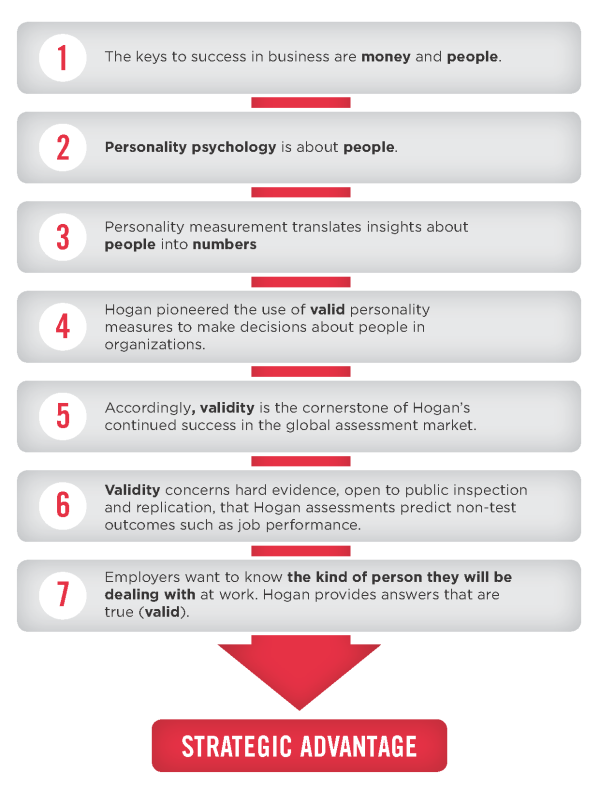A quick-reference guide to understanding how validity relates to Hogan’s business model and marketing content.

A quick-reference guide to understanding how validity relates to Hogan’s business model and marketing content.

Topics: assessment, personality psychology, validity
 In the past 10 days, much of the country has been blanketed by snow, courtesy of a blizzard that swept through the Midwest and buried the Hogan offices under nearly 30 inches. Stores closed, events were cancelled, businesses sent everyone home, and most of the area hunkered down and braced for the worst. The local meteorologists provided marathon sessions of analysis and updates, warning everyone not to go outside unless absolutely necessary. In the following days, the city cleanup crews described their efforts to clear the streets, noting that the largest obstacle was the number of abandoned cars on the road. This included cars deserted in the middle of the street, on the side of the road, on highway ramps, and just about everywhere.
In the past 10 days, much of the country has been blanketed by snow, courtesy of a blizzard that swept through the Midwest and buried the Hogan offices under nearly 30 inches. Stores closed, events were cancelled, businesses sent everyone home, and most of the area hunkered down and braced for the worst. The local meteorologists provided marathon sessions of analysis and updates, warning everyone not to go outside unless absolutely necessary. In the following days, the city cleanup crews described their efforts to clear the streets, noting that the largest obstacle was the number of abandoned cars on the road. This included cars deserted in the middle of the street, on the side of the road, on highway ramps, and just about everywhere.
This made me think about the judgment exercised by the owners of the autos lining the roads. The majority of these vehicles were smaller cars that had virtually no chance of navigating the streets. I assume that most of the owners simply walked home, as they couldn’t have possibly made it far before getting stuck. Was it that they were skeptical and didn’t trust the weather forecast? Did they believe their driving ability was far superior to others? Did they think the warnings and advice didn’t apply to them? Or did they really just not understand that 15 inches of snow was too much for them?
Whatever the case, the same types of characteristics that drive these decisions will influence decision-making and judgment in the workplace. We’ve all encountered the skeptical co-worker that doesn’t trust others and plays political games, the employee who believes that his or her talents are infinitely superior to those around them, the folks that don’t believe the rules apply to them, and the ones that just don’t seem to have the ability to analyze the situation and make good decisions. Often the results won’t be as immediate and obvious as an abandoned car in the middle of the street, but over time the results will become visible and detrimental.
While we can’t dramatically improve other motorists’ skills on the roads, we can identify and target the types of behaviors that lead to these bad decisions in an organization. Many of these characteristics are rooted in our personalities and cognitive abilities. We can screen these characteristics out of candidate pools, or we can raise awareness of these characteristics with current employees and enhance decision-making styles and abilities.
Topics: personality psychology, behavior
Social psychology concerns how people behave in specific situations—for example, as members of a jury panel or eye witnesses to a mugging. Social psychology is very popular, but it doesn’t concern “human nature,” it concerns how people behave in carefully defined contexts.
Personality psychology concerns “human nature"—understanding oneself and other people independent of specific situations. Despite its importance, it is vastly less popular than social psychology—for example, there are only about 400 personality psychologists in the United States.
Even worse, modern personality psychology largely focuses on aspects of the so-called Big Five Theory. According to this respected academic model, what we know about ourselves and other people can be described as follows:
1. Some people are shy and reserved; others are outgoing and talkative
2. Some people are nervous and guilt prone, others are confident and resilient
3. Some people are impulsive and reckless, other people are cautious and self-disciplined
4. Some people are rude and insensitive, others are charming and tactful
5. Some people are narrow minded, others are open-minded.
Much modern research is devoted to the genetics and neurological underpinnings of these five dimensions.
An academic friend just returned from an accreditation visit to a psychology program in Denmark. He was surprised to find that the Danes are interested in Sigmund Freud and psychoanalysis and have yet to discover Big Five Theory—which would represent progress on their part.
But consider the following six Freudian generalizations about people and decide which theory—Big Five or Freud—has the more interesting things to say about people.
1. Development matters; unpleasant events from childhood nag us for the rest of our lives.
2. The most important developmental event concerns how children relate to adult authority. Some children become rebellious and defiant, some accommodate, and some become slaves to authority. The Conscientiousness dimension of Big Five theory captures attitudes toward authority. Scores on this dimension predict a wide range of important career and health related outcomes. Low scorers tend to be creative and entrepreneurial and do well in sales—but they have problems following rules of any kind. High scorers tend to be disciplined and procedural and do well in accounting and law enforcement—and enjoy following and enforcing rules.
3. Every human relationship is ambivalent; even those people we most like and respect do things that annoy us and that is a lesson with which we have to learn to live.
4. Everyone is self-deceived, all people lie to themselves about their motives and desires, and spin theories about why they behave as they do. The real motives behind much social behavior—including behavior that seems perfectly altruistic—are completely selfish and egoistic.
5. There are real, biological differences between women and men, and these differences have consequences. For example, women are better students than men because they are more conscientious, dutiful, and eager to please.
6. Leadership and personality are inextricably intertwined. Leaders have charisma, but are ultimately narcissistic and possibly psychopathic; followers are needy, dependent, and gullible. The leadership process can only be understood in terms of the relationships that form between leaders and followers.
We can learn many important lessons about human nature from Freud, lessons that we ignore at our personal and collective peril. At the same time, however, Alfred Adler, Carl Jung, Karen Horney, Erik Erikson, and George Kelly have important things to say about human nature; their ideas are an important part of the rational/humanistic intellectual heritage of the West. The modern indifference to personality theory means we are in danger of losing this heritage.
Dr. Robert Hogan
President
Hogan Assessment Systems
Topics: leadership, Sigmund Freud, personality psychology, Big Five Theory, social psychology
© 2014 Hogan Assessment
Systems
Privacy Policy | Legal Policy